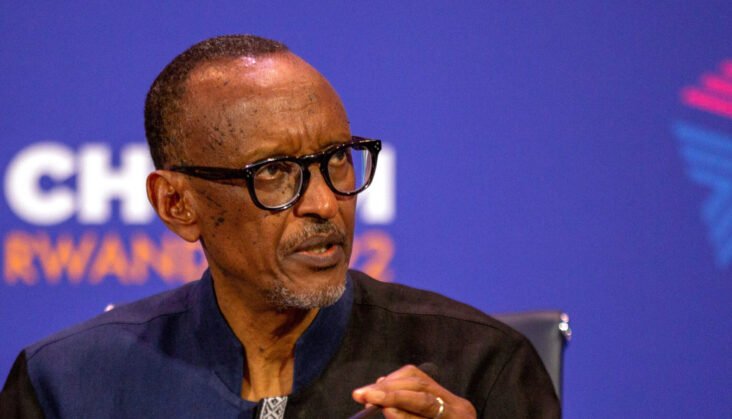[ad_1]
Speaking to France 24, he said: “I would consider running for another 20 years. I have no problem with that. Elections are about people choosing.”
However, controversy surrounded the last presidential election five years ago, where Kagame reportedly won 99% of the vote. Following Kagame’s announcement, Human Right Watch’s Central African Director, Lewis Mudge said: “What comes as a surprise is that some people are indeed surprised. Rwanda is a country where it’s very, very dangerous to oppose the government, let alone to be a political opponent…”
Kagame, who is now 64, became president in 2000 after former president Pasteur Bizimungu resigned, winning against Rwandan Patriotic Front (RPF) secretary-general Charles Murigand, making him the fourth elected president of Rwanda.
In 1994, when he was 36, Kagame’s RPF party forced out Hutu extremists responsible for the infamous genocide killing about 800,000 Tutsi people. He was considered the de facto ruler from then until 2000, serving as Vice President and Minister of Defence under his predecessor.
How is re-election possible?
In 2003, the Rwandan constitution changed and said presidents would have a seven-year tenure renewable once. However, another change in 2015 removed the seven-year term and allows presidents to serve two five-year terms, starting in 2017, which allowed Kagame to run for his third term. The referendum to change the constitution in 2015 had more than 90% of the vote.
Critic of the Rwandan government, Charles Kambanda, a lawyer and university lecturer based in the US is worried about the country’s future, saying: “If he continues for another 20 years Rwanda will be real hell.”
Kagame’s landslide win came as no surprise in a context in which Rwandans who have dared to raise their voices or challenge the status quo have been arrested, forcibly disappeared, or killed…
Previous elections
After 2000, Kagame ran for president in 2003, 2010 and 2017, winning more than 90% of the vote each time. However, after the 2017 election, Human Rights Watch released evidence stating that election officials had forced voters to cast their vote in full view and had even voted for electors that did not show up.
Ida Sawyer, the former Central Africa director at Human Rights Watch said at the time: “Kagame’s landslide win came as no surprise in a context in which Rwandans who have dared to raise their voices or challenge the status quo have been arrested, forcibly disappeared, or killed … the Rwandan authorities took no chances with the presidential vote, as repression continued … despite weak prospects for any opposition candidate.”
Human rights champion or abuser?
Accused of human rights violations, Kagame defended his country’s position at a Commonwealth summit in Kigali at the end of last month. Although critics say he runs an authoritarian regime, Kagame claims to be a promoter of development and freedom.
Reporters Without Borders have said he attacks press freedom, saying that many journalists have either been killed, gone missing, or had to flee while he was in power.
Its Africa head in 2017, Clea Kahn, said in the run-up to the last elections that “the idea is still to control discourse on social media, including by trolling journalists.”
[ad_2]
Source link
